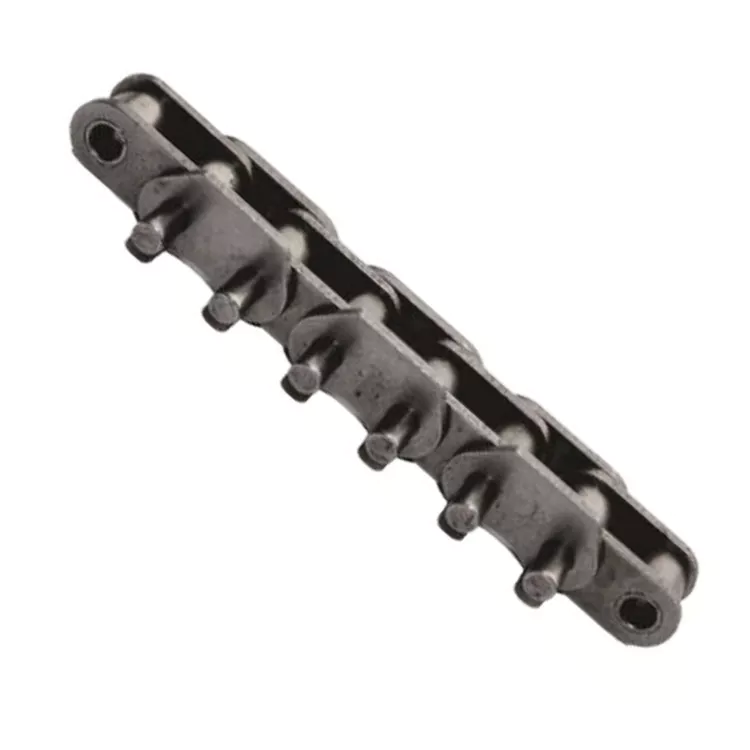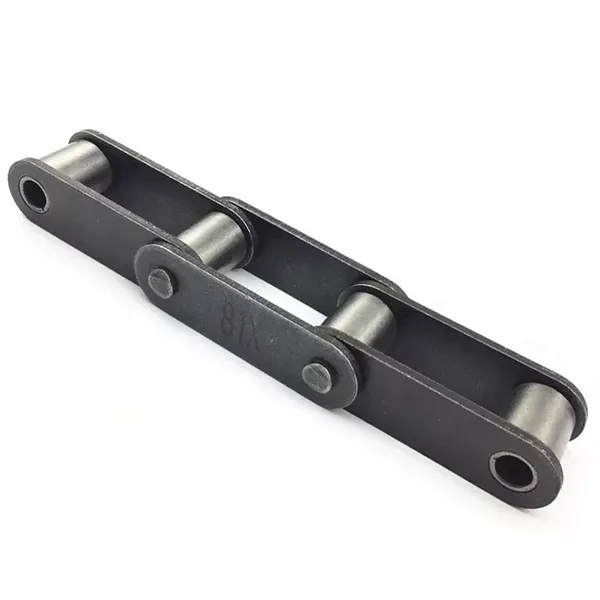Product Description
Scraper chain Specifications
1. Transmission chain with forged links .
2. alloy steel links with large tension strength.
3. easy install and maintenance.
4. ISO2001,SEW
5.We are the only nation standard drafter and maker of scraper chain.
Process: Forging and Machining
Raw Material: Quality Carbon Steel & Alloy Steel
Product Status: Semi-finished Forgings Or Finished Products
Processing Machine: 300-2500T Friction Press
Processing Crafts: Hot Drop Forging & Machining
Surface Treatment: Spray Coating & Chemistry & Shot Blasting & Anti-dust Treatment
Detection: In Accordance With The Customer’s Requirements
Product Specification: In Accordance With The Customer’s Requirements(Drawing Or Sample)
Package: In Accordance With The Customer’s Requirements
Inspection:
1. The whole quality control management has been strictly carried out from raw material coming to
Final products
2. Third party inspection available CHINAMFG requirement.
Our many Main Export Market:
Exported to U. S. A, U. K, Germany, Italy, Japan, Swiss, Australia, Korea, and South-east Asia and get good credits form them.
Our target:
To supply top quality products with reasonable price, circumspect and satisfactory service with Punctual
Our Competitive Advantages:
1. Much experiencing in forging part
2. Disciplined staffs and scientific operation;
4. Product performance;
5. Advanced produce and inspecting equipments;
6. Prompt Delivery;
7. Quality control system: ISO 9001: 2000& 14001: 2004&ISO/TS16949
8. Best Service;
| Model | Forged Scraper Chain Conveyor For Mining Machinery |
| Color | Neutral,black,zinc-plated |
| Logo Stamping | punching or as requested |
| Standard | ISO/ANSI/DIN/JIS |
| Price | Factory-directly competitive price |
| Quality | Best raw material and Equipments, skilled workers for roller chains |
| Service | Deep After-sale service guarantee |
| Main Market | SNG,North America, South America, Europe,Asia and Domestic Market |
| OEM | Supported |
| ODM& OEM SERVICES | |
| Service | Drawings or samples processing/OEM/ODM service provided |
| Produce Process | Drawings→ mould making → pre-forging →rough machining
or finish machining →surface treatment →product checking → packing →delive ry |
| Forging Material | Carbon Steel, Alloy steel,Stainless steel |
| Standard | ISO, GB, ASTM, DIN, JIS |
| Produce Equipment | Friction Screw Press Series, CNC Lathe, Machining Center
(Vertical Spindles), CNC Milling Machine, Bench Drilling Machine, Heat Treatment Equipments and so on. |
| Surface treatment | Heat treatment, Polishing, shot blasting,
Painting, Electro-plating, Chemical Plating, |
| Inspection
Equipments |
Metallurgical analysis , Tensile strength tester , Hardness
tester, Altimeter, Scale Micrometer, pressure tester, etc. |
| Delivery | Sample s are sent by express
Large quantity products delivered to customer by sea or according to your request |
/* January 22, 2571 19:08:37 */!function(){function s(e,r){var a,o={};try{e&&e.split(“,”).forEach(function(e,t){e&&(a=e.match(/(.*?):(.*)$/))&&1
| Processing Object: | Metal |
|---|---|
| Molding Style: | Forging |
| Molding Technics: | Forging |
| Application: | Machinery Parts |
| Material: | Steel |
| Heat Treatment: | Annealing |
| Customization: |
Available
| Customized Request |
|---|

Can a conveyor chain be used in high-load applications?
Yes, a conveyor chain can be used in high-load applications. Conveyor chains are designed to withstand heavy loads and provide reliable and efficient material handling in various industries. Here’s a detailed explanation:
– Robust Construction:
A conveyor chain for high-load applications is typically constructed using durable materials such as alloy steel or stainless steel. These chains are designed to withstand the forces and stresses imposed by heavy loads without deformation or failure.
– High Load Capacity:
Conveyor chains for high-load applications are designed with larger and stronger components, including thicker plates, larger pins, and stronger attachments. These enhancements allow the chain to handle heavier loads and distribute the weight evenly across the chain’s links and rollers.
– Proper Selection:
When using a conveyor chain in high-load applications, it is crucial to select the appropriate chain type and size based on the specific load requirements. Factors such as the weight of the conveyed material, the conveyor speed, and the operating conditions should be considered during the selection process.
– Lubrication and Maintenance:
In high-load applications, proper lubrication and regular maintenance of the conveyor chain are essential. Adequate lubrication reduces friction and wear, ensuring smooth operation and extending the chain’s service life. Regular inspections and maintenance routines help identify any issues or wear that may affect the chain’s performance.
– Application-Specific Chains:
In some cases, specialized conveyor chains, such as forged link chains or roller chains, are used to handle extremely heavy loads. These chains offer enhanced strength and durability, making them suitable for demanding high-load applications.
Overall, a properly selected and maintained conveyor chain can reliably handle high-load applications, providing efficient and continuous material handling in industries such as mining, construction, automotive, and heavy manufacturing.

How do you prevent corrosion in conveyor chains?
Preventing corrosion in conveyor chains is essential for maintaining their performance and prolonging their lifespan. Here are some effective measures to prevent corrosion:
1. Material Selection: Choose conveyor chains made from corrosion-resistant materials such as stainless steel, plastic, or coatings specifically designed to resist corrosion. These materials offer better protection against rust and corrosion compared to standard steel chains.
2. Proper Lubrication: Apply a suitable lubricant to the conveyor chain regularly. Lubrication creates a protective barrier that helps prevent moisture and contaminants from reaching the metal surface, reducing the risk of corrosion. Select a lubricant that provides corrosion protection properties and is compatible with the chain material.
3. Environmental Controls: Control the operating environment to minimize exposure to corrosive elements. Implement measures such as humidity control, proper ventilation, and protection from direct contact with water or chemicals. Consider using covers or enclosures to shield the conveyor chain from environmental factors that can accelerate corrosion.
4. Surface Treatments: Apply corrosion-resistant coatings or treatments to the conveyor chain. These coatings can provide an additional protective layer that acts as a barrier against moisture and corrosive substances. Examples of surface treatments include zinc plating, galvanizing, or epoxy coatings.
5. Regular Inspections and Cleaning: Regularly inspect the conveyor chain for signs of corrosion or damage. Remove any accumulated dirt, debris, or corrosive substances promptly. Cleaning the chain helps prevent the buildup of contaminants that can accelerate corrosion.
6. Preventive Maintenance: Implement a preventive maintenance program that includes regular cleaning, lubrication, and inspection of the conveyor chain. This proactive approach helps identify and address any potential corrosion issues early on, preventing further damage.
7. Proper Storage: When not in use, store the conveyor chains in a dry and controlled environment. Protect them from exposure to moisture, humidity, and corrosive substances. Use appropriate storage methods, such as hanging the chains or storing them in sealed containers.
By following these preventive measures, you can significantly reduce the risk of corrosion in conveyor chains, ensuring their optimal performance and longevity.

What are the common causes of conveyor chain failures?
Conveyor chain failures can occur due to various reasons, and identifying the root cause is crucial for preventing future issues. Here are some common causes of conveyor chain failures:
- Lack of Lubrication: Insufficient or improper lubrication can lead to increased friction and wear on the chain components, resulting in premature failure.
- Excessive Load: Overloading the conveyor chain beyond its rated capacity can cause excessive stress and strain, leading to chain elongation, deformation, or link breakage.
- Misalignment: Improper alignment of the conveyor chain can cause uneven loading and excessive wear on specific areas, leading to chain failure.
- Environmental Factors: Harsh operating environments, such as high temperatures, corrosive substances, or abrasive materials, can accelerate chain wear and corrosion, leading to failure.
- Foreign Objects: The presence of foreign objects or debris on the conveyor system can interfere with the movement of the chain, causing jamming, binding, or chain damage.
- Poor Maintenance: Inadequate maintenance practices, such as irregular inspections, failure to address minor issues promptly, or neglecting to replace worn components, can contribute to chain failures.
- Incorrect Installation: Improper installation, including incorrect tensioning, misalignment, or using incompatible components, can result in premature chain failure.
- Fatigue and Wear: Continuous operation over time can lead to fatigue and wear in the chain, especially in high-speed or heavy-duty applications, resulting in eventual failure.
Regular maintenance, proper lubrication, adequate training for operators, and adherence to manufacturer guidelines can help mitigate these common causes of conveyor chain failures. Conducting routine inspections, promptly addressing issues, and replacing worn components can also significantly extend the life of the conveyor chain.


editor by CX 2024-03-01